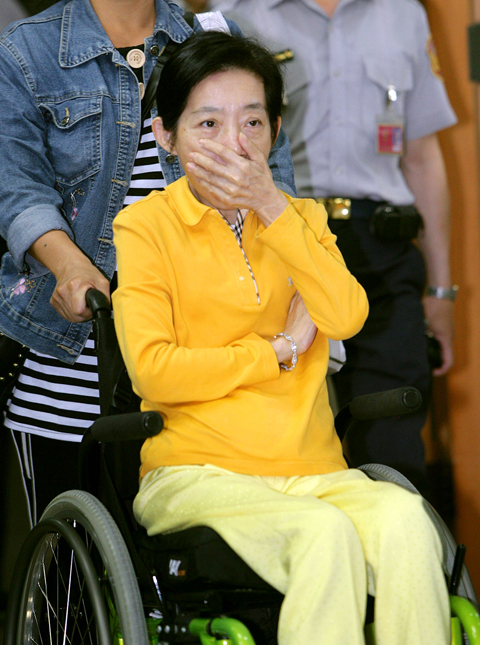Former first lady Wu Shu-jen (吳淑珍) yesterday denied taking bribes and profiteering in the first pre-trial hearing for a second wave of charges brought against her.
She said that she received NT$300 million (US$9.2 million) in political donations from former Chinatrust Financial Holding Co vice chairman Jeffrey Koo Jr (辜仲諒) and admitted that she violated the Political Donation Act (政治獻金法) because she did not report them.
However, she denied that the money she took from Koo and former Taipei Financial Center Corp chairwoman Diana Chen (陳敏薰) were bribes or illegal gains, adding that she didn’t use the money for personal expenses.

PHOTO: CNA
On May 5, prosecutors said they had concluded the second part of the investigation into the former first family. They charged former president Chen Shui-bian (陳水扁) and his wife with taking bribes, profiteering and violating the Political Donation Act.
Prosecutors accused the former president and his wife of accepting NT$10 million in bribes from Diana Chen.
Prosecutors alleged that Diana Chen gave the former first lady NT$10 million to secure the presidency of Grand Cathay Securities Corp (大華證券).
The indictment also accused the couple of inappropriately taking NT$300 million in political donations from Koo.
Prosecutors accused the former president of using election campaign funds and secret foreign relations as excuses to ask Koo for donations, which the couple then pocketed.
Separately, in response to her daughter, Chen Hsing-yu (陳幸妤), being charged with perjury on Wednesday, Wu told reporters: “I respect the judicial system.”
TV footage showed her grim-faced yesterday morning as she prepared to take the high-speed rail to Taipei for the hearing.
Before Wednesday, Chen Hsing-yu had been the only immediate family member of Chen Shui-bian not named as a defendant in relation to the former first family’s alleged money laundering activities.

Chinese Nationalist Party (KMT) Chairman Eric Chu (朱立倫), spokeswoman Yang Chih-yu (楊智伃) and Legislator Hsieh Lung-chieh (謝龍介) would be summoned by police for questioning for leading an illegal assembly on Thursday evening last week, Minister of the Interior Liu Shyh-fang (劉世芳) said today. The three KMT officials led an assembly outside the Taipei City Prosecutors’ Office, a restricted area where public assembly is not allowed, protesting the questioning of several KMT staff and searches of KMT headquarters and offices in a recall petition forgery case. Chu, Yang and Hsieh are all suspected of contravening the Assembly and Parade Act (集會遊行法) by holding

PRAISE: Japanese visitor Takashi Kubota said the Taiwanese temple architecture images showcased in the AI Art Gallery were the most impressive displays he saw Taiwan does not have an official pavilion at the World Expo in Osaka, Japan, because of its diplomatic predicament, but the government-backed Tech World pavilion is drawing interest with its unique recreations of works by Taiwanese artists. The pavilion features an artificial intelligence (AI)-based art gallery showcasing works of famous Taiwanese artists from the Japanese colonial period using innovative technologies. Among its main simulated displays are Eastern gouache paintings by Chen Chin (陳進), Lin Yu-shan (林玉山) and Kuo Hsueh-hu (郭雪湖), who were the three young Taiwanese painters selected for the East Asian Painting exhibition in 1927. Gouache is a water-based

Taiwan would welcome the return of Honduras as a diplomatic ally if its next president decides to make such a move, Minister of Foreign Affairs Lin Chia-lung (林佳龍) said yesterday. “Of course, we would welcome Honduras if they want to restore diplomatic ties with Taiwan after their elections,” Lin said at a meeting of the legislature’s Foreign Affairs and National Defense Committee, when asked to comment on statements made by two of the three Honduran presidential candidates during the presidential campaign in the Central American country. Taiwan is paying close attention to the region as a whole in the wake of a

OFF-TARGET: More than 30,000 participants were expected to take part in the Games next month, but only 6,550 foreign and 19,400 Taiwanese athletes have registered Taipei city councilors yesterday blasted the organizers of next month’s World Masters Games over sudden timetable and venue changes, which they said have caused thousands of participants to back out of the international sporting event, among other organizational issues. They also cited visa delays and political interference by China as reasons many foreign athletes are requesting refunds for the event, to be held from May 17 to 30. Jointly organized by the Taipei and New Taipei City governments, the games have been rocked by numerous controversies since preparations began in 2020. Taipei City Councilor Lin Yen-feng (林延鳳) said yesterday that new measures by